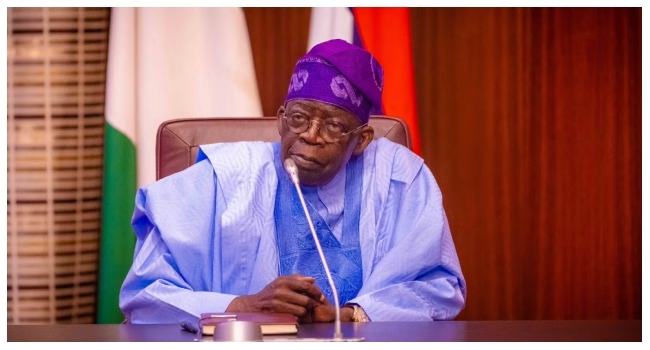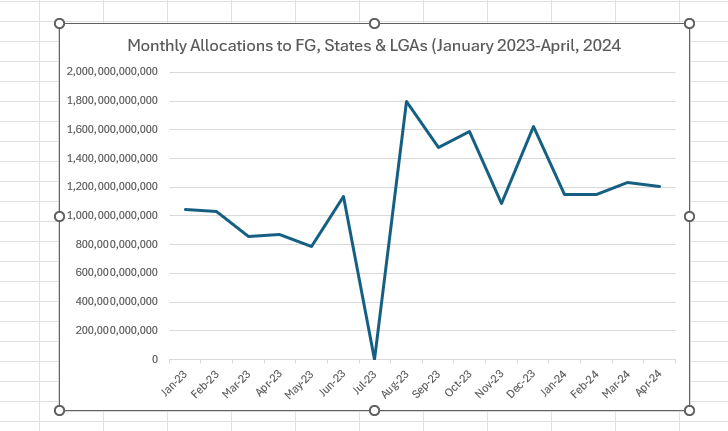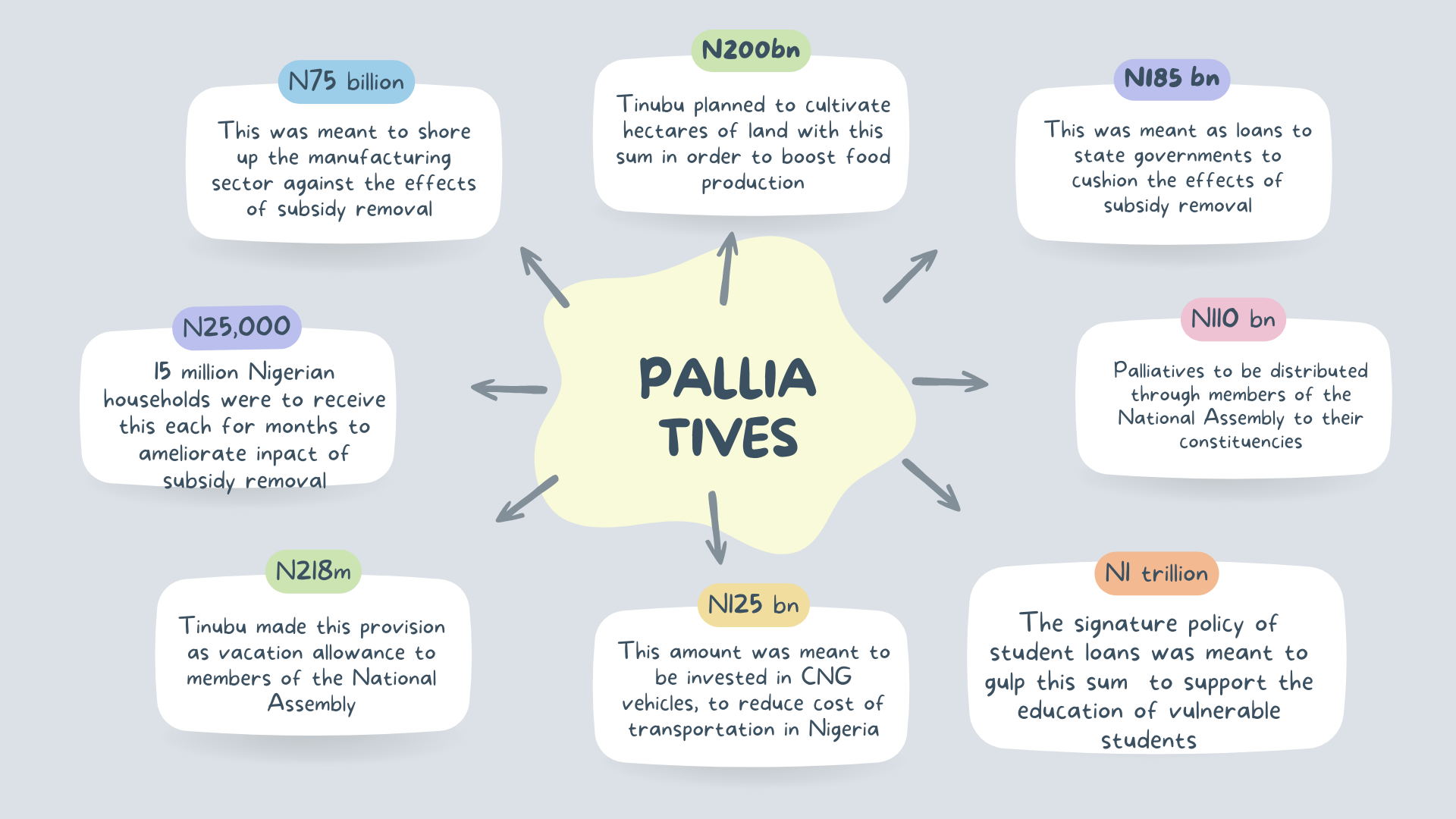Tinubu’s 12 long and short leap in first year

[contact-form][contact-field label=”Name” type=”name” required=”true” /][contact-field label=”Email” type=”email” required=”true” /][contact-field label=”Website” type=”url” /][contact-field label=”Message” type=”textarea” /][/contact-form]
[contact-form][contact-field label=”Name” type=”name” required=”true” /][contact-field label=”Email” type=”email” required=”true” /][contact-field label=”Website” type=”url” /][contact-field label=”Message” type=”textarea” /][/contact-form]
Theophilus Abbah
-
Increased monthly allocations to states and local governments:
On May 29, 2023, after his inauguration as President, Tinubu’s first decision was the removal of fuel subsidy, a decision that previous presidents considered crucial but too sensitive to make. However, that singular statement has put a lot of money in the pockets of federal, states and local governments. On the average, the three tiers of governments shared N800 billion every month in the previous dispensation, but the amount has jumped to an average of N1.6 trillion monthly. This means Tinubu’s government came with a windfall for government, as funds are available for big infrastructure projects, if they are judiciously applied. Between June and April 2024, the three tiers of government have shared as much as N13.4 trillion, an amount that is almost a half of the 2024 annual budget. The chart below shows the trend of increased finances available to the three tiers of government, from about N800b in March to about N1.2 trillion in June and peaking at N1.8 trillion around September 2023.

Monthly allocations shared by Federal, States and Local Governments in the first year of the Tinubuadministration. Source: FAAC
-
Sanction on Niger Coupists:
Perhaps, one of the confusing moments for Tinubu was when on July 26, 2023, soldiers from the Presidential Guard in Niger Republic overthrew the government of President Mohammed Bazoum, a close ally of former President Muhammadu Buhari. Barely two months in power, Tinubu took a no-nonsense step, to demonstrate to the soldiers that military rule was unwanted in Africa. He closed Nigeria’s borders with Niger Republic, cut off electricity supply to the landlocked country, and imposed economic sanctions. However, the measures hurt Nigerians who share borders with Niger Republic, especially in the North-West of Nigeria. After various diplomatic efforts, Tinubu had to lift the sanctions on March 13, 2024.
-
Cleared Buhari’s indebtedness to ASUU
The Academic Staff Union of Universities (ASUU) had a running battle with former President Mohammadu Buhari, culminating in strike actions and the withholding of the university lecturers’ salaries for seven months. Tinubu had promised to do everything possible to avert strikes by university lecturers. One of the steps he took was to order the payment of the withheld seven month salaries. That instruction was issued in October 2023, though as at February 2024 only four months outstanding salaries had been paid. In the context of the long battle with the previous administration, with the former Minister of Labour, Senator Chris Ngige, claimed to have invoked ‘no work no pay’ policy to excuse government from paying ASUU, the release of funds for ASUU members outstanding salaries was a major policy measure for the Tinubu administration.
-
Sack of CBN Governor Emefiele and EFCC chairman Bawa
Though not unexpected, the dramatic way Tinubu sacked former Central Bank of Nigeria (CBN) Governor Godwin Emefiele on September 16, 2023, after three months of romance with the administration, was unforgettable. As the country marks one year of the Tinubu government, the main fall man from the Buhari era remains former CBN Governor Emefiele. Other actors in the assumed massive corruption under the Buhari government are yet to be called to account for their misdeeds. On May 24, a Lagos High Court granted the EFCC’s application for Emefiele to forfeit N830 billion; $4.7 million, mansions, and landed properties to the Federal Government. Another fall man was a former Chairman of the EFCC, Abdulrasheed Bawa, who was detained for 134 days by the Department of State Security (DSS), then replaced and forced into silence without a probe or prosecution. Unlike previous EFCC chairpersons before him whose removal were accompanied by a litany of offences they were accused of having committed, the Tinubu government failed to explain to Nigerians what Bawa did wrongly that warranted his removal. Perhaps, the other persons in the previous administration whose activities came under scrutiny was former Aviation Minister Hadi Sirika, who was dragged to court by the EFCC for alleged corruption to the tune of N19.4 billion.
The Tinubu government failed to explain to Nigerians what Bawa did wrongly that warranted his removal
8.The promissory note of $14 billion investment from G-20 in India.
President Tinubu has travelled to over a dozen countries in the last one year, but the one his handlers gloat about was the G-20 meeting in India in September 2023. In his drive for foreign investment by the Group of 20 Development Countries in the world, he met the president of Brazil, India, South Korea and Germany, who promised to invest about $14 billion in the Nigerian economy. The State House claimed that at the Summit, Indorama Petrochemical promised to commit $8 billion in the fertilizer sector; SkipperSeil Limited vowed to commit $1.6 billion in the power sector; Jindal Steel & Power Limited promised to invested $3 billion in power sector; there was another deal of $1 billion for the Defense Industries Corporation of Nigeria (DICON), making a total of $14 billion. The timelines for the investments were not revealed, but Tinubu’s participation in the G-20 Summit in India seemed to have provided a glimpse into what Nigeria expects as FDI in the near future. Tinubu has been to Germany, Brazil, United Arab Emirates (UAE), Saudi Arabia, the United States, Qatar, the United Kingdom, Gineau Bissau, and several other countries. The economic benefits for these trips may spring up before the end of his administration in three year’s time.
The timelines for the investments were not revealed
-
Release of kidnapped GSS, Kuriga students in Kaduna state – without payment of ransom
In March 2024, bandits in Kaduna State staged a Boko Haram kind of kidnapping by abducting 137 students from Government Secondary School, Kuriga. The bandits made a demand of N1 billion for the release of the students, but Tinubu insisted that his government would never pay ransom. However, about 17 days after, the bandits released the students on March 24, 2024. It was not clear in any unofficial ransom was paid, but the incident established Tinubu as a president who would not bend over backward to please terrorists. The National Security Adviser, Malam Nuhu Ribadu, told Nigerians that the government would not succumb to pressures to fund terrorists by paying any form of ransom. The spokesman of the army, Major- Gen Edward Buba, told Nigerians that students, made up of 76 girls and 61 boys, were rescued from Zamfara state, which shares borders with Kaduna.
-
Promises of Palliatives
One of the actions taken by Tinubu that resonates with Nigerians in the last one year was made on October 1, 2023, when he promised to provide palliatives to cushion the effects of his harsh economic measures. The promises included the followings: N75b to strengthen the manufacturing sector; N200 bn for the cultivation of hectares of farmlands; N185bn as loans to states to cushion the effects of fuel subsidy removal; N25,000 to be given to 15 million households in three months; N218m as vacation allowances to senators; N125bn for CNG-powered fueled vehicles; N1 trillion for student loans; N35,000 wage award to Federal Government and state government workers; and N110 billion palliative through National Assembly members. The measures sound like redistributing the gain from the removed fuel subsidy among Nigerians. However, eight months after the promises were made, only limited number of Nigerians have been touched by this benevolence. Even the wage award of N35,000 to workers has been paid for only three or four times. Tinubu needs to do more to earn the honour as a promise keeper, not covenant breaker.

Palliatives that Tinubu promised Nigerians
-
Tertiary Education Students Loan:
On May 24, 2024, the Nigerian Education Loan Fund’s portal was formally opened for students of Federal Government and states’ tertiary institutions to apply for study loans. The Act setting up this fund was one of the earliest signed into law by Tinubu, a symbolic measure to assure students of tertiary institutions that he was deliberate about improving their welfare at school. A statement from the Presidency on April 4, 2024 when Tinubu assented to the revised Bill said students who shall access the loan must be “qualified Nigerians” and it shall be “for tuition, fees, charges, and upkeep during their studies in approved tertiary academic institutions and vocational and skills acquisition institutions in Nigeria.” The potential applicants for the loan are some 1.3 million Nigerians in tertiary institutions. If this scheme is implemented carefully, it would likely be considered as one of the major achievements of the Tinubu administration. It will provide relief from worries about school fees to thousands of students.
If this scheme is implemented carefully, it would likely be considered as one of the major achievements of the Tinubu administration
-
Victory at Supreme Court in the presidential election petition
The remarkable day for Tinubu and his family in the last one year may be October 26, 2024, the day the Supreme Court affirmed him as the winner of the February 23, 2023 presidential election. Due to ‘technical glitches’ that the Independent National Electoral Commission (INEC) said frustrated the upload of presidential election result on IReV, there were widespread doubts that the election was credible, and that the Supreme Court could set aside the judgement of the Court of Appeal, and, perhaps, take a decision that might unseat Tinubu. It didn’t happen. The 7-man panel of justices, led by Justice John Okoro declared “There is no merit in this appeal, and it is hereby dismissed.” The appeals were by the Peoples Democratic Party (PDP) and the Labour Party candidates in the February election. That court judgment gave Tinubu a firm mandate to lead the country.
-
Electricity Tariff increase:
In his inaugural speech on May 29, 2023, newly sworn-in President Tinubu spoke on electricity thus: “electricity will become more accessible and affordable to businesses and homes alike. Power generation should nearly double and transmission and distribution networks improved. We will encourage states to develop local sources as well.” Contrary to this promise, the Tinubu government took some paragraphs from the International Monetary Fund (IMF’s) advisory and sought to increase electricity tariff in March 2024. The measure attracted a loud outcry, as it was evident that the president’s priority was not to keep his promise of making electricity affordable but to keep to IMF’s advice, though it was inimical to the wellbeing of Nigerians. The increase was rejected by the National Assembly and the Nigeria Labour Congress (NLC) which had to picket the Nigerian Electricity Regulatory Commission (NERC), the Transmission Company of Nigeria (TCN) and Discos across the country, to oppose the tariff increase for what is called Band A electricity users. The increase in tariff was necessary because of the devaluation of the Naira, but Nigerians count themselves unlucky as the Tinubu dispensation came with policies that impoverish the people. Electricity tariff increase was rejected by a cross-section of Nigerians; the Tinubu government must find a way around the cost of producing and distributing electricity – without a hike in the tariff.
-
Unification of foreign exchange windows (devaluation of the Naira)
The Daily Trust newspaper published an exclusive story on June 1, 2023, three days after Tinubu was sworn in as president that the Federal Government was planning to devalue the Naira, from N430 to $1 to N650 to $1. The monetary measure was bad news for Nigerians who were still under shock from the removal of subsidy on fuel without a corresponding socio-economic support to cushion its effect on the population. Initially, the CBN denied the story. But few days later, government announced a collapse of the official rate and the Black Market rates, a strategy that led to a free fall of the Naira. Instead of exchanging for N650, the dollar rather exchanged for N700 initially, and gradually slided to N900/$1, crossed the N1000/$1 prediction, and continued to fall until it hit N1,800/$1. Though the Naira gained value in the later part of April 2024, it further began to tumble in May. As Nigerians marked the anniversary of Tinubu’s administration, it was clear that the Naira was exchanging for N1,500/$1. The devaluation of the Naira affected every facet of life in Nigeria, as the cost of imported and locally-manufactured goods jumped in triples. Millions of Nigerians were rendered poorer, with weakened purchasing power; manufacturing companies began to close shops, primarily due to the difficulty in purchasing the USD and the weak purchasing power of Nigerians. This policy affected Nigerians more negatively than the removal of fuel subsidy.
Though the Naira gained value in the later part of April 2024, it further began to tumble in May
-
Removal of fuel subsidy
On May 29, 2023, after reading his inaugural speech, Tinubu had an addendum, not written in his speech: “Fuel subsidy is gone.” The section of the speech about fuel subsidy did not contain that speech act of removing subsidy on petrol. It read: “We commend the decision of the outgoing administration in phasing out the petrol subsidy regime which has increasingly favoured the rich more than the poor. Subsidy can no longer justify its ever-increasing costs in the wake of drying resources. We shall instead re-channel the funds into better investment in public infrastructure, education, health care and jobs that will materially improve the lives of millions.” On this first day of the Tinubu administration, instead of celebrating the new president, Nigerians from rural areas to big cities began to mourn over the impending bleak future that began with the increase in the pump price of petrol from N192/1 litre to N580/1 litre. This singular decision made youths to migrate from Nigeria to other parts of the world where government catered for the needs of its people. The prices of goods rose riotously. For the first time, the subsidy on petroleum was removed without any effective strategies to cushion its effects on the people. Tinubu’s handlers told Nigerians that the pains and anger over subsidy removal would fizzle away and Nigerians would adjust to the new socio-economic hardship. For one year now, Nigerians have been tired, frustrated, and impoverished in such thickness that time cannot erode. The economic disaster that has followed the removal of subsidy has a long term effect on the people.
Read also: Nigeria’s Fuel Price Hike Syndrome And Tinubu’s Reign Of Pains
Sign up for The Insight Newsletter
Get in-depth, research and data-based interpretative reports from around Nigeria.



